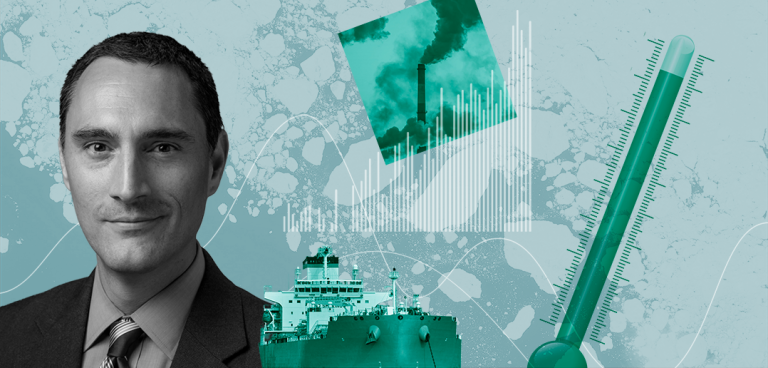Professor Adam Orford, joining the Fordham Law faculty this year, is an expert on climate change, clean energy, and environmental law and policy. His interdisciplinary research focuses on legal strategies for deep decarbonization of the global industrial economy, with work examining clean energy development, carbon credit trading, and the regulatory frameworks governing greenhouse gas emissions.
In the Q&A below, Orford discusses his forthcoming article exploring the legal arguments over the current administration’s deep cuts to federal spending to address climate change. According to Orford, in making these reductions in expenditures, the government is making new law and legal arguments that are reverberating with implications for the separation of powers between the three branches of the federal government.
Looking more broadly at the legal profession, Orford is struck by how deeply environmental law intersects with legal issues that, at first glance, appear unrelated to climate change. His big idea? Environmental law impacts everyone, and all lawyers should be climate-informed—regardless of their field of practice.
What got you interested in this field of study?
I grew up in Alaska and got involved in environmental law, in part, because I was a child when the Exxon Valdez oil spill happened in the 1980s. I have devoted my career to environmental protection and, most recently, to assessing what is necessary in order to respond to climate change.
I’ve called climate change the most complicated economic, environmental, engineering, and political problem we face. It’s also just an extraordinarily fascinating and challenging topic to study, and it requires expertise and background in multiple disciplines. But it all comes down to how our policy decisions are formulated in law, and that’s what I work on.
What is novel about your current research?
Environmental law has long been sensitive to electoral politics, with new presidential administrations often deeply influencing how laws are implemented, even when the text of the laws themselves doesn’t change. But recently something even more dramatic has happened: the federal executive is essentially refusing to administer some of the nation’s most important environmental laws. One of the ways it is doing that is by refusing to spend congressionally appropriated funds.
Traditionally, climate law has been thought about in terms of regulation and requirements—mandates, bans on things—but politically, these have been pretty impossible to get passed into law at the national level in the United States. The Biden administration instead built its entire climate law strategy around federal spending, with the Bipartisan Infrastructure Law, which involved transportation and energy spending, and the Inflation Reduction Act, which was focused on tax incentives for clean technologies.
The second Trump administration is doing something new and unique, dismantling the entire climate-spending state as quickly and as comprehensively as they can. And while doing that, they’re actually developing novel law, new legal arguments, and challenges not only to climate law, but to the fundamental relationship between the various branches of the federal government, congressional spending powers, and the judicial power to oversee the executive as it tries to implement what Congress has said it must do.
So, there’s a great deal that starts to bloom out of studying what could sound like very boring and technical budgetary law. Since very few people in the climate law space have ever really tackled that, I thought it was a great opportunity to contribute something interesting, new, and timely.
How does the subject matter you are working on impact the legal community?
This year, I was a member of the American Bar Association’s (ABA) in-person delegation to the 29th Conference of Parties (COP) to the U.N. Framework Convention on Climate Change in Baku, Azerbaijan. I had the opportunity to attend as a member of the ABA’s Section of Environment, Energy, and Resources’ Climate Task Force, which sent a delegation to observe the proceedings.
For the last four COPs, the delegation’s mission has been to promote the engagement of the legal profession in the problems of climate change and to talk about climate-informed lawyering, which is the idea that even if you practice an area of law that you might not think relates to climate change, actually it does. If you practice immigration law and have a client who has been displaced by flooding, you are practicing climate change law. If you practice corporate law and have to assess potential risks and liabilities in a business transaction and the company is exposed to the climate, you are practicing climate change law. There are so many different ways that climate comes up unexpectedly in different areas of law.
Climate change permeates our world. It is our world. Our climate is all around us. And trying to keep up with the scientific and technical and policy and economic and social arguments and literature—it’s overwhelming, but it can be really useful, no matter what you do. And there are special questions for lawyers as well: what does it mean to be an ethical lawyer in a world of climate change? It’s something that we’re encouraging people to talk about and consider as we begin to experience the effects of climate change in real time.
How does your scholarship in this area relate to your teaching?
It is important for our students to have the most up-to-date knowledge about the legal, political, and technical cutting-edge issues in the field of climate change law, but I also appreciate that they’re stepping into a really complicated space that has been debated and argued over for decades, especially as scientific knowledge keeps expanding. I try to structure my courses to provide essential background while also being able to easily integrate current events. Doing research helps me know that I am giving our students the very best education that they can get, and also keeps me on my toes as I develop a curriculum that is interesting and relevant.

